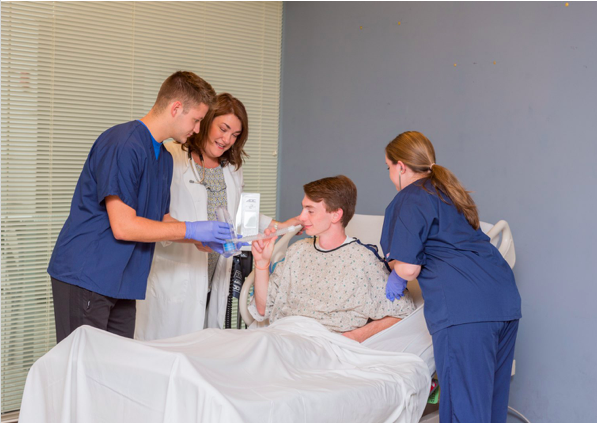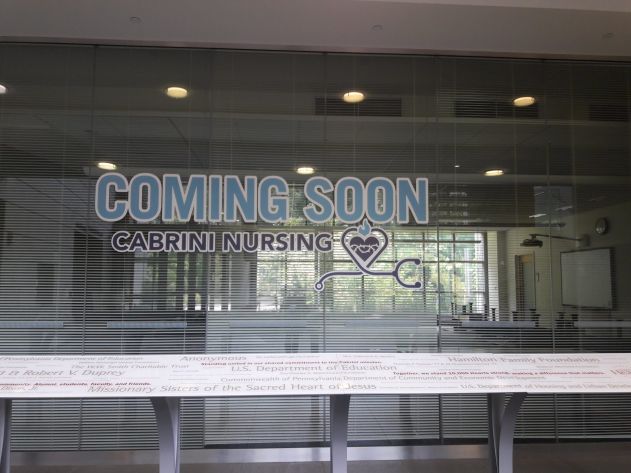In Fall 2020, Cabrini University will welcome its inaugural nursing cohort.
The program was created in response to a demand from students who wanted to study nursing at Cabrini. “Before this program was launched, a lot of people came here for biology and then transferred out so they could be nurses,” Dr. Jennifer Specht, RN, the founding director of the nursing program, said.
Each year, the program will add another class. There is a goal of 30-40 students in each class. At full capacity, the program is expected to cap between 120-160 students.
By fall 2022, the program is expected to be built out with four full-time faculty members.
Admission requirements are more stringent than for other majors, requiring students to submit an SAT/ACT score and have a minimum GPA of 3.2. Over 450 applications have been received thus far and there is currently a waitlist.
Since the program is currently open to incoming freshmen only, students cannot transfer into the program. However, that is subject to change in the future.
The facilities, which include a Clinical Simulation Center (CSC), will be housed on the ground floor of the Iadarola Center, where the former Academic Services Center and the adjacent computer lab were located. Over the summer, these offices were moved to the Rooymans Activity Center.

The CSC is intended to help students gain hands-on situational experience. It will be particularly helpful in preparation for clinical practice.
The university recently announced $30,000 grant from the McLean Contributionship. The grant will aid in providing the necessary technology and equipment for the CSC.
An additional $1 million donation from James J. (HON ’13) and Francis Maguire donated $1 million to the program will assist in “program development.” It will establish the Maguire Nursing Scholars, a scholarship program designated for nursing students.
To become a registered nurse, nursing students must pass the national NCLEX exam. As Specht explains that, unlike traditional multiple-choice exams, NCLEX will test a student’s knowledge and application of the material.
“You not only know about a heart attack, you need to know the signs and symptoms of that when you walk into your patient’s room,” Specht said. “Is that chest pain because they are having a heart attack? Or is it chest pain because they are having indigestion?”
Specht noted that students during their junior year will start taking exams similar to the NCLEX format to prepare them for the exam after graduation.
To comply with state regulation the core nursing curriculum is the same at every school. However, Specht notes that the “education of the heart” mission is what differentiates Cabrini’s program from others. The program will focus on providing “holistic care to diverse individuals, families, and communities.”
Locations where students can have clinicals, include “local hospitals and health networks, intimate partner/domestic violence shelters, centers for addiction treatment… [and] agencies for children and adults with intellectual and/or physical disabilities.
Although clinicals do not begin until junior year, students will begin professional development as early as freshman year.

Nursing seminars, which occur during the freshman and sophomore years, aim to “enculturate the students into the nursing profession.” Aside from the professional development aspects, the seminar will also expose students to “various experiences with the healthcare needs of the surrounding communities.”
Specht noted that nursing seminars are aimed to prepare students for their clinicals, which will begin in their junior and senior years. By that time, “They pretty much have a foundation of what it means to be a nurse, and then they can learn how to be one,” Specht noted.
Specht has designed the curriculum to reflect several key themes, such as “Leadership, a voice for the profession and caring for patients… service to underserved populations and population and community health.”
Before her arrival at Cabrini, Specht worked in both hospital and academic settings.
After working as a critical care nurse in the post-operative cardiac unit, Spect began teaching and taking administrative roles at colleges in the Lehigh Valley and Greater Philadelphia Regions.
She was drawn to Cabrini because of its mission and the “Education of Heart” philosophy.
“The first thing that attracted me here was the mission of Cabrini,” Specht said. “The fact the mission and nursing really were basically made to be blended together.”
Specht notes that she’s looking forward to the program’s launch this fall.
“I am excited to have nursing students on campus and have them be part of my daily experience,” Specht said. “I miss that student interaction and having relationships with the students.”


